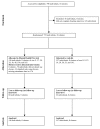Mental health first aid training of the public in a rural area: a cluster randomized trial [ISRCTN53887541]
- PMID: 15500695
- PMCID: PMC526774
- DOI: 10.1186/1471-244X-4-33
Mental health first aid training of the public in a rural area: a cluster randomized trial [ISRCTN53887541]
Abstract
Background: A Mental Health First Aid course has been developed which trains members of the public in how to give initial help in mental health crisis situations and to support people developing mental health problems. This course has previously been evaluated in a randomized controlled trial in a workplace setting and found to produce a number of positive effects. However, this was an efficacy trial under relatively ideal conditions. Here we report the results of an effectiveness trial in which the course is given under more typical conditions.
Methods: The course was taught to members of the public in a large rural area in Australia by staff of an area health service. The 16 Local Government Areas that made up the area were grouped into pairs matched for size, geography and socio-economic level. One of each Local Government Area pair was randomised to receive immediate training while one served as a wait-list control. There were 753 participants in the trial: 416 in the 8 trained areas and 337 in the 8 control areas. Outcomes measured before the course started and 4 months after it ended were knowledge of mental disorders, confidence in providing help, actual help provided, and social distance towards people with mental disorders. The data were analysed taking account of the clustered design and using an intention-to-treat approach.
Results: Training was found to produce significantly greater recognition of the disorders, increased agreement with health professionals about which interventions are likely to be helpful, decreased social distance, increased confidence in providing help to others, and an increase in help actually provided. There was no change in the number of people with mental health problems that trainees had contact with nor in the percentage advising someone to seek professional help.
Conclusions: Mental Health First Aid training produces positive changes in knowledge, attitudes and behaviour when the course is given to members of the public by instructors from the local health service.
Figures
Similar articles
-
Mental health first aid training in a workplace setting: a randomized controlled trial [ISRCTN13249129].BMC Psychiatry. 2004 Aug 15;4:23. doi: 10.1186/1471-244X-4-23. BMC Psychiatry. 2004. PMID: 15310395 Free PMC article. Clinical Trial.
-
Mental health first aid training for high school teachers: a cluster randomized trial.BMC Psychiatry. 2010 Jun 24;10:51. doi: 10.1186/1471-244X-10-51. BMC Psychiatry. 2010. PMID: 20576158 Free PMC article. Clinical Trial.
-
Mental health first aid training for the public: evaluation of effects on knowledge, attitudes and helping behavior.BMC Psychiatry. 2002 Oct 1;2:10. doi: 10.1186/1471-244x-2-10. BMC Psychiatry. 2002. PMID: 12359045 Free PMC article.
-
Mental health first aid training: review of evaluation studies.Aust N Z J Psychiatry. 2006 Jan;40(1):6-8. doi: 10.1080/j.1440-1614.2006.01735.x. Aust N Z J Psychiatry. 2006. PMID: 16403032 Review.
-
Development of mental health first aid guidelines on how a member of the public can support a person affected by a traumatic event: a Delphi study.BMC Psychiatry. 2010 Jun 21;10:49. doi: 10.1186/1471-244X-10-49. BMC Psychiatry. 2010. PMID: 20565918 Free PMC article. Review.
Cited by
-
First aid recommendations for psychosis: using the Delphi method to gain consensus between mental health consumers, carers, and clinicians.Schizophr Bull. 2008 May;34(3):435-43. doi: 10.1093/schbul/sbm099. Epub 2007 Sep 3. Schizophr Bull. 2008. PMID: 17768307 Free PMC article.
-
Confidence and motivation to help those with a mental health problem: experiences from a study of nursing students completing mental health first aid (MHFA) training.BMC Med Educ. 2020 Mar 6;20(1):69. doi: 10.1186/s12909-020-1983-2. BMC Med Educ. 2020. PMID: 32143699 Free PMC article. Clinical Trial.
-
Willingness to Seek Help for Depression in Young African American Adults: Study Protocol.JMIR Res Protoc. 2020 Feb 7;9(2):e16267. doi: 10.2196/16267. JMIR Res Protoc. 2020. PMID: 32044756 Free PMC article.
-
Helping intentions of undergraduates towards their depressed peers: a cross-sectional study in Sri Lanka.BMC Psychiatry. 2017 Jan 23;17(1):40. doi: 10.1186/s12888-017-1192-7. BMC Psychiatry. 2017. PMID: 28114918 Free PMC article.
-
Systematic review and meta-analysis of Mental Health First Aid training: Effects on knowledge, stigma, and helping behaviour.PLoS One. 2018 May 31;13(5):e0197102. doi: 10.1371/journal.pone.0197102. eCollection 2018. PLoS One. 2018. PMID: 29851974 Free PMC article.
References
-
- Kitchener BA, Jorm AF. Mental Health First Aid Manual. Canberra, Centre for Mental Health Research; 2002.
Publication types
MeSH terms
Associated data
LinkOut - more resources
Full Text Sources
Medical



